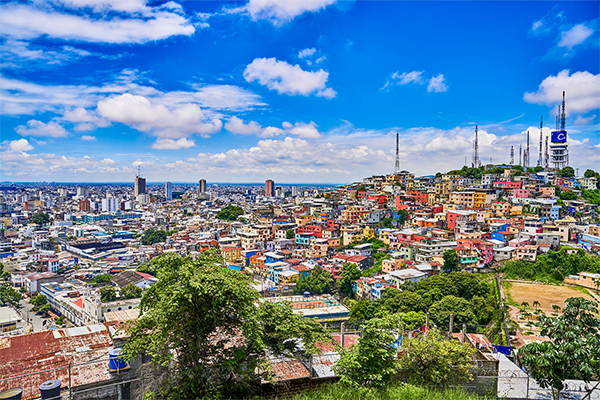
Thinking about moving to Guayaquil? Below we highlight some of the pros and cons of living in Guayaquil.
Guayaquil, the largest city in Ecuador, is a bustling metropolis that offers a unique blend of urban life and natural beauty. Nestled on the banks of the Guayas River and close to the Pacific Ocean, Guayaquil is a city of contrasts, with its modern skyscrapers, historic neighborhoods, and lush green spaces. But like any city, living in Guayaquil has its pros and cons. Let’s delve into the specifics of what it’s like to live in this vibrant South American city.
Pros of Living in Guayaquil
One of the biggest advantages of living in Guayaquil is its climate. The city enjoys a tropical savanna climate, which means it’s warm and sunny throughout the year. This makes it an ideal place for outdoor activities, such as hiking in the nearby Cerro Blanco Protected Forest or strolling along the Malecón 2000, a 2.5-kilometer boardwalk along the Guayas River.
Guayaquil is also a city of rich history and culture. The Las Peñas neighborhood, with its colorful houses and cobblestone streets, is a testament to the city’s colonial past. Here, you can visit the Museo Municipal de Guayaquil, which houses a collection of pre-Columbian artifacts, or the Nahim Isaias Museum, which showcases Ecuadorian colonial art. The city also hosts numerous festivals throughout the year, such as the Guayaquil Independence Day in October, offering residents a chance to immerse themselves in local traditions.
Another advantage of living in Guayaquil is its affordability. Compared to other major cities in South America, the cost of living in Guayaquil is relatively low. This extends to everything from housing and utilities to groceries and dining out. For example, a meal at a mid-range restaurant in Guayaquil can cost as little as $10, while a one-bedroom apartment in the city center can be rented for around $300 per month.
Guayaquil also offers numerous opportunities for volunteering and community involvement. Organizations such as Fundación Guayaquil, which focuses on social development and education, and Fundación Natura, which works on environmental conservation, are always looking for volunteers. This allows residents to give back to the community and make a positive impact.
Finally, Guayaquil is a gateway to some of Ecuador’s most stunning natural attractions. The city is just a short flight away from the Galapagos Islands, one of the world’s top destinations for wildlife viewing. Closer to home, the Manglares Churute Ecological Reserve offers a chance to explore mangrove forests and spot local wildlife such as howler monkeys and herons.
Cons of Living in Guayaquil, Ecuador
Despite its many advantages, living in Guayaquil also has its downsides. One of the main challenges is the city’s high crime rate. While the situation has improved in recent years, crime, including petty theft and violent crime, remains a concern, particularly in certain neighborhoods. It’s important for residents to take precautions, such as avoiding walking alone at night and keeping valuables out of sight.
Another downside of living in Guayaquil is the traffic. Like many large cities, Guayaquil suffers from congestion, particularly during rush hour. This can make commuting a hassle, and the city’s public transportation system, while extensive, can be crowded and unreliable.
While Guayaquil’s tropical climate is a draw for many, it can also be a disadvantage. The city’s high humidity can make the heat feel oppressive, particularly during the wet season, which runs from January to April. Additionally, the city is prone to flooding during this time, which can cause disruptions to daily life.
Another challenge of living in Guayaquil is the language barrier. While English is taught in schools, it’s not widely spoken outside of the tourism industry and the expat community. This can make everyday tasks, such as shopping or dealing with bureaucracy, more difficult for those who don’t speak Spanish.
Finally, while Guayaquil offers a range of amenities, it lacks some of the cultural offerings of other major cities. For example, while the city has a number of museums and theaters, it doesn’t have the same breadth and depth of cultural institutions as cities like Quito or Cuenca. This can be a drawback for those who crave a vibrant arts and culture scene.


